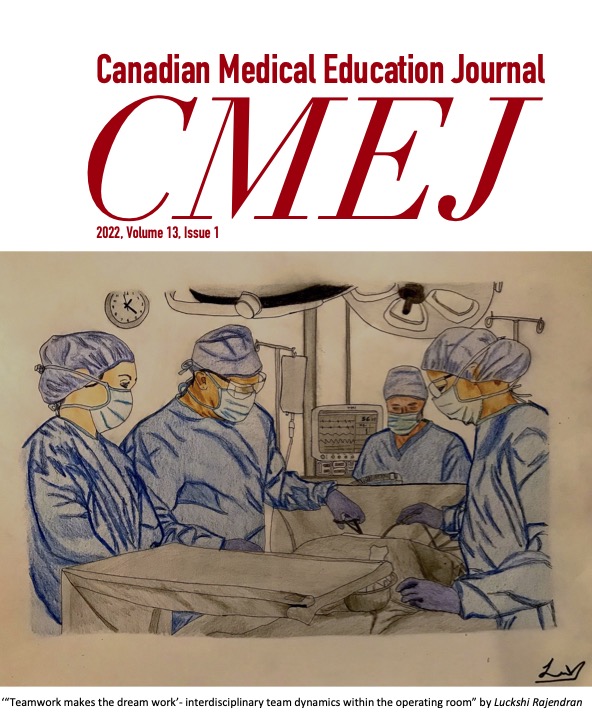“Get the DNR”: residents’ perceptions of goals of care conversations before and after an e-learning module
DOI:
https://doi.org/10.36834/cmej.71956Abstract
Background: Residents frequently lead goals of care (GoC) conversations with patients and families to explore patient values and preferences and to establish patient-centered care plans. However, previous work has shown that the hidden curriculum may promote physician-driven agendas and poor communication in these discussions. We previously developed an online learning (e-learning) module that teaches a patient-centered approach to GoC conversations. We sought to explore residents’ experiences and how the module might counteract the impact of the hidden curriculum on residents’ perceptions and approaches to GoC conversations.
Methods: Eleven first-year internal medicine residents from the University of Toronto underwent semi-structured interviews before and after completing the module. Themes were identified using principles of constructivist grounded theory.
Results: Prior to module completion, residents described institutional and hierarchical pressures to “get the DNR” (Do-Not-Resuscitate), leading to physician-centered GoC conversations focused on code status, documentation, and efficiency. Tensions between formal and hidden curricula led to emotional dissonance and distress. However, after module completion, residents described new patient-centered conceptualizations and approaches to GoC conversations, feeling empowered to challenge physician-driven agendas. This shift was driven by greater alignment of the new approach with their internalized ethical values, greater tolerance of uncertainty and complexity in GoC decisions, and improved clinical encounters in practice.
Conclusion: An e-learning module focused on teaching an evidence-based, patient-centered approach to GoC conversations appeared to promote a shift in residents’ perspectives and approaches that may indirectly mitigate the influence of the hidden curriculum, with the potential to improve quality of communication and care.
Downloads
Published
Issue
Section
License
Copyright (c) 2019 Leora Branfield Day, Stephanie Saunders, Leah Steinberg, Shiphra Ginsburg, Christine Soong

This work is licensed under a Creative Commons Attribution-NonCommercial-NoDerivatives 4.0 International License.
Submission of an original manuscript to the Canadian Medical Education Journal will be taken to mean that it represents original work not previously published, that it is not being considered elsewhere for publication. If accepted for publication, it will be published online and it will not be published elsewhere in the same form, for commercial purposes, in any language, without the consent of the publisher.
Authors who publish in the Canadian Medical Education Journal agree to release their articles under the Creative Commons Attribution-Noncommercial-No Derivative Works 4.0 Canada Licence. This licence allows anyone to copy and distribute the article for non-commercial purposes provided that appropriate attribution is given. For details of the rights an author grants users of their work, please see the licence summary and the full licence.











